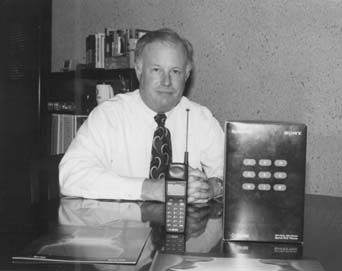Sprint PCS Sets Out to Replace Cellular
Sprint PCS Sets Out to Replace Cellular

Digital Technology Promises Greater Quality, Security
With a presence in over 40 markets nationwide and dozens more on the way, Sprint PCS is hoping to lead the way in providing the next generation of wireless communication technologies.
"Cellular phones today offer raw utility they may not sound perfect, they may drop calls occasionally, but the value I receive far outweighs the difficulty that I have," explains David T. Stevens, area vice president of Sprint PCS. "We're taking that same utility and offering a better product, and we think the penetration of wireless is just going to accelerate."
The company occupies two offices in Hacienda, one on Chabot Drive, which houses engineering, and another on Hacienda Drive, home to field operations for the California North Area.
PCS is a Post-Cellular System
That "better product" is PCS, which stands for Personal Communications Services. PCS is a digital technology that offers many advantages over existing cellular systems, including improved sound and security. Battery life is improved as well: users can talk for four hours or keep a phone on standby for over two days on a single charge.
"PCS also allows us to deliver a lot more functionality, some of which we'll be delivering at launch and some of which will be delivered subsequently," says Stevens. "Those functions include short messaging, data through a modem, true packet data, and a number of other features over time." The current Sprint PCS handset combines a phone, text pager and answering machine in a single unit.
The Sprint PCS network uses CDMA, an acronym for Code Division Multiple Access, which is proving to be the most popular method for deploying PCS. "It's very efficient, which means that the system capacity should serve a subscriber base better than any other technology out there," says Stevens. "These inherent technical advantages translate directly into consumer benefits over time."
Planning a National Network
Sprint PCS is a partnership between Sprint Corporation, which owns 40 percent of the venture, and three cable companies: Tele-Communications, Inc. (TCI), Comcast Corporation, and Cox Communications, which own 30, 15 and 15 percent of the venture, respectively.
Total capitalization of Sprint PCS is $10 billion, which includes contributions from the four partners as well as their network hardware suppliers, Lucent Technologies and Northern Telecom (Nortel).
The strength of the partners has put Sprint PCS in a unique position. "We now have licenses, literally, to build our network through the entire United States using a single frequency and a single technology, and that makes us unique in this game," explains Stevens.
"We think over time this will be a major strength for us."
Local Areas Coming Soon
The first of Sprint PCS's networks deployed in Northern California was in Fresno, which was launched December 16 of last year. According to Stevens, the system's launch in Sacramento is "very close," with the greater Bay Area to follow in the third quarter of this year.
"We'll be in 65 markets by about mid-year, which includes about 35 of the top 50 metropolitan areas," says Stevens. "Even though we're not everywhere, it's a very significant footprint given the short time we've had to build it, which so far has been about 18 months."
Photo: David Stevens, Sprint PCS area vice president, with their new digital phone.
Also in this issue...




